Sunday Reflections | 31st Sunday in Ordinary Times
By SIDTP SoCom
Published on November 3, 2024
One of the scribes, when he came forward and heard them disputing, and saw how well Jesus had answered them, asked him, “Which is the first of all the commandments?”
Jesus replied, “The first is this: ‘Hear, O Israel! The Lord our God is Lord alone! You shall love the Lord your God with all your heart, with all your soul, with all your mind, and with all your strength.’
The second is this: ‘You shall love your neighbor as yourself.’ There is no other commandment greater than these.”
The scribe said to him, “Well said, Teacher; you are right in saying, ‘He is One and there is no other than he.’ And to love him with all your heart, with all your understanding, and with all your strength, and to love your neighbor as yourself is worth more than all burnt offerings and sacrifices.”When Jesus saw that he answered with understanding, he said to him, “You are not far from the Kingdom of God.” And no one dared to ask him any more questions.
In today’s Gospel, Jesus is asked a simple yet profound question by a scribe: “Which is the first of all the commandments?” The answer Jesus gives is life-changing, not just for those who heard Him then, but for us today. Jesus says that the greatest commandment is to love God with all our heart, soul, mind, and strength. This is the most important thing we can do as followers of Christ—to give God our full attention, devotion, and love in everything we do.
Jesus goes even further and teaches that the second greatest commandment is to love our neighbor as ourselves. This commandment is just as important as the first, because our love for God is expressed through how we treat others. We cannot truly love God if we are not showing love to the people around us, especially those who are in need.
This teaching of Jesus boils down to two simple yet radical calls: love God with everything you are, and love your neighbor as you love yourself. All of our faith, all the teachings of the Bible, and all of the commands we find in Scripture flow from these two core truths.
Loving God means giving Him the first place in our lives—prioritizing our relationship with Him above all else. It means seeking His presence in our daily lives, opening our hearts to Him in prayer, and living according to His will. It’s easy to get caught up in the distractions of life—the busyness of work, the pull of possessions, the stress of everyday worries. But Jesus reminds us that our love for God must be total, not partial.
Loving our neighbor means seeing others through the eyes of God, with compassion and kindness. It’s about treating people with respect, offering a listening ear, and being willing to help when there is need. Loving our neighbor is not just about those who are close to us, but also about those we may not know well, or even those who might be difficult to love. Jesus calls us to love all people, just as He has loved us.
When Jesus tells the scribe that he is “not far from the Kingdom of God,” He is reminding us that these two commandments are the key to entering into God’s kingdom. A life lived in love for God and love for others is a life that is in alignment with God’s will—a life that brings us closer to the Kingdom of Heaven.
As we reflect on this Gospel, we might ask ourselves: How can we love God more fully in our lives? Are there areas where we need to grow in our love for others? In our busy world, it’s easy to forget that love is not just a feeling but a decision, a choice that we make every day in the way we treat others and in how we give ourselves to God.
Let us pray for the grace to live these two commandments more fully. May our love for God be reflected in how we love those around us, and may we become instruments of His love in a world that so desperately needs it.



